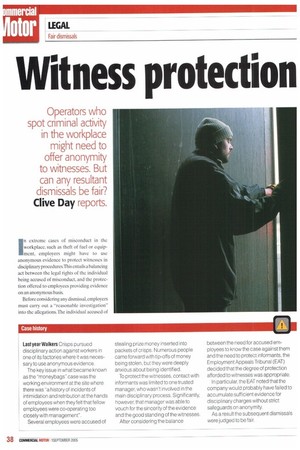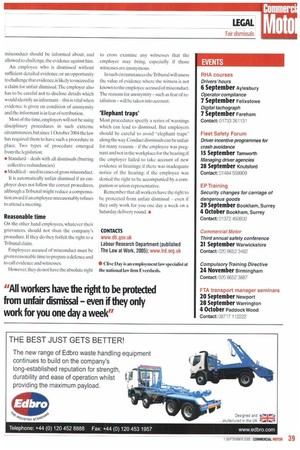Witness protection
Page 38

Page 39

If you've noticed an error in this article please click here to report it so we can fix it.
Operators who spot criminal activity in the workplace might need to offer anonymity to witnesses. But can any resultant dismissals be fair?
Clive Day reports.
In extreme cases of misconduct in the workplace, such as theft of fuel or equipment, employers might have to use anonymous evidence to protect witnesses in disciplinary procedures.This entails a balancing act between the legal rights of the individual being accused of misconduct, and the protection offered to employees providing evidence on an anonymous basis.
Before considering any dismissal, employers must carry out a -reasonable investigation into the allegation& The individual accused of misconduct should be informed about, and allowed to challenge, the evidence against him.
An employee who is dismissed without sufficient detailed evidence, or an opportunity to challenge that evidence, is likely to succeed in a claim for unfair dismissal. The employer also has to be careful not to disclose details which would identify an informant this is vital when evidence is given on condition of anonymity and the informant is in fear of retribution, Most of the time, employers will not be using disciplinary procedures in such extreme eircumstances.but since 1 October 2004 the law has required them to have such a procedure in place. Two types of procedure emerged from the legislation: • Standard deals with all dismissals (barring collective redundancies) • Modified used in cases of gross misconduct.
It is automatically unfair dismissal if an employer does not follow the correct procedures, although a Tribunal might reduce a compensation award if an employee unreasonably refuses to attend a meeting.
Reasonable time On the other hand employees, whatever their grievances, should not shun the company's procedure. If they do they forfeit the right to a Tribunal claim.
Employees accused of misconduct must be given reasonable time to prepare a defence and to call evidence and witnesses.
However, they do not have the absolute right to cross examine any witnesses that the employer may bring, especially if those witnesses are anonymous.
In such circumstances the Tribunal will assess the value of evidence where the witness is not known to the employee accused of misconduct. The reasons for anonymity such as fear of retaliationwill be taken into account.
'Elephant traps' Most procedures specify a series of warnings which can lead to dismissal. But employers should be careful to avoid "elephant traps" along the way. Conduct dismissals can be unfair for many reasons if the employee was pregnant and not in the workplace for the hearing; if the employer failed to take account of new evidence at hearings; if there was inadequate notice of the hearing; if the employee was denied the right to be accompanied by a companion or union representative.
Remember that all workers have the right to be protected from unfair dismissal even if they only work for you one day a week on a Saturday delivery round. •




































































































































































































